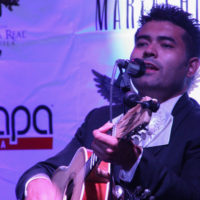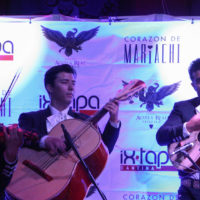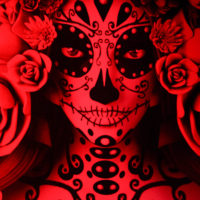On a sweltering night inside a dim cantina, glasses clink and patrons burst into drunken laughter, while on the center stage blinding fluorescent lights illuminate the faces of mariachi players. The musicians are clad in suits that match the lit sky, sweating from the hour-long performance of singing, strumming and seducing the audience with love songs.
The final notes escape into the air, which seconds later develop into applause and shouts calling for an encore. Among the players, caressing the sounds out of his guitar, is Roberto Diaz, the director and founder of the group Mariachi Quinto Sol.
“To perform, it means freedom,” Diaz says. “Especially when you’re on stage singing. It’s relaxation, almost like you’re meditating.”
Diaz created his group three and a half years ago after playing for others and wanting to develop into a more modern mariachi style.
Diaz wants his band to perform mariachi style while maintaining the traditional aspect of it, but also to incorporate new sounds that have a more modern and dynamic feel.
“I find the traditional sound nice and I love it and it’s never going to go away,” Diaz says. “But to me and a lot of younger mariachis out there, which is more proliferated around California, there’s a need to express a different sound that is sometimes limited by tradition.”
Classic mariachi is composed of harmonies (string instruments), such as the violin, vihuela, guitar and guitarron, as well as trumpets.
“A violin is a violin, a trumpet is a trumpet, but when it comes to the harmony part, which is the vihuela, and the guitarron are very specific,” Diaz says. “That’s their own thing right there.”
Within the time frame of the creation of his group, up until the present day, Diaz describes the challenges he deals with to keep the group afloat.
According to Diaz, like any musical group would probably tell you, the beginning is hard because it is easier to join a group and play with whoever they’d like, especially if they have some talent. However, to start a group is tough because work is not plentiful.
“You sometimes have to charge an amount you shouldn’t charge, but you have to do it because you need to get your name out there,” Diaz says. “There’s a lot of experiences. Even your own musicians – when there’s not a lot of work, they don’t want to follow you along.”
As time went on and Mariachi Quinto Sol gained more work experience, networking with different people and companies, Diaz says their name has slowly become more recognized.
“It doesn’t get easier, because there’s always challenges, but you cement yourself, and then you’re able to go with the flow,” Diaz says.
According to Pierce College adjunct music instructor James Bergman, who has lived in three major cities including San Francisco, New York and Los Angeles, all cities offer greater opportunities for musicians.
“All cities are a melting pot, just every pot is different,” Bergman says. “Out here we have a lot of Mexican influence and there are Latin influences in New York, but it’s more Caribbean based.”
Bergman says that of all the cities, LA is the place to be for both songwriters and listeners.
According to the breakdown of the purchases, the cost of being a mariachi group is approximately $7,000, with each instrument at least $2,000. The sound system is between $2,000 and $3,000, the strings for the violins, guitars and other instruments have to be swapped every couple weeks. Plus the gas driving gig to gig varies, but is an expense that adds up.
According to Diaz, sometimes you lose money when you’re in charge of a group, because you pay certain people to perform on a certain day or night.
Then there’s the mariachi suit, which is another $1,000. The suit is an investment that they have to renew each year but worth the cost, says Diaz.
“The feeling when you put on a mariachi suit is a very personal experience,” says Diaz. “When you put on a suit you get attention. Most people just respect it because it represents their family and a way of life.”
Isaac Lisando Yañez, 19, is a student at Los Angeles Mission College and a guitarron player for Mariachi Quinto Sol.
He joined the group when he was a sophomore in high school and says it helps him to pursue his dream of playing music with legendary players, such as Mariachi los Camperos.
At one point he got to meet Chuy Guzman, one of the Mariachi los Camperos members, during a rehearsal.
“I was very honored [to meet Chuy],” Yañez says. “When I practice, I listen to them and think to myself that I would like to meet them and ask them questions about how they started playing music.”
He says that he loves mariachi and tells everyone about what he does.
“Most people that know me, such as my family members and friends support me and say that it’s cool,” Yañez says. “But for me it’s twice as amazing. I consider myself lucky that I get to play. I’m just a proud musician.”
From performing in front of small audiences, to playing for thousands of listeners, mariachi is an art form that is beloved by many and connects different generations. However, mariachi faces the issue of being misrepresented.
According to Diaz, there is always a misrepresentation about mariachi, which is imagined to be an old fat man with three or four instruments screaming. Diaz has worked on shows, such as Pure Genius, Silicon Valley, and Scream Queens.
“I did a season in Disneyland and the director was like make Mexican-sounds,” Diaz says. “They’re not being racist or stereotyping, it’s just the image that has formed here for a long time.”
The reality is that older men are the minority in this for the most part.
It’s a lot of young people, from teenagers to men in their 40s. It’s an art form, but what you see out there in movies is not what real mariachi bands are about.
He says that at first he liked being a musician for the perks, but over time his perspective has changed.
“The older you get, the more you understand what it means, where it’s coming from and how it makes you feel,” Diaz says. “It’s not just the superficial aspects of the music, but eventually you start to appreciate what the music means for people who’ve done this for a long time, even before I was born.”






